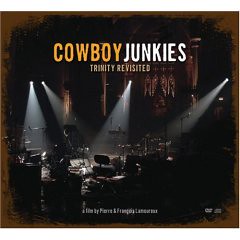
Cowboy Junkies
Trinity Revisited
Zöe-Rounder
2008
What is it about 1988's original Trinity Sessions that made an impression on a confused 17-year-old living in San Antonio? It spoke to the need as a misunderstood, wandering spirit searching for a connection with similar souls that could reflect and identify with that yearning that I was feeling inside. Listening to the Cowboy Junkies, it was if this band understood how I felt, being a loner and isolated in the world.
The Cowboy Junkies' Trinity Sessions made me feel less alone. Listening to Margo Timmins, the Canadian chanteuse, was like spending a night in a universe that's eternally dusk, where the stars of hope shine all day and night as she crooned the songs like "Blue Moon Revisited" sings your blues away. There was something about Margo's voice when she sang that reflected the endless yearning, which sent ripples straight through to my young stuttering heart. The song that first grabbed hold of me and shook me was the evocative cover Lou Reed's "Sweet Jane." But that was only the beginning. What kind of album stars off with an a cappella track? The kind of record that's recorded in two days at The Church of Holy Trinity in Toronto with one microphone like they did in the classic recordings in the 1950s.
The Junkies opened me up to a new world of true country standards like "I'm So Lonesome I Could Cry" and "Walking After Midnight" that I never heard as a scrawny bitter rebellious youth. I was intrigued. If it wasn't for Trinity Sessions I may never have begun my journey of appreciation for such artists as Johnny Cash, Willie Nelson, Patsy Cline and Hank Williams.
Trinity Sessions has that classic and timeless feel. If you close you eyes while listening to the album, you can picture yourself there inside the church that captures the sound of the Junkies, the reverberations still in the air, in your ears, capturing the once in a lifetime performance that has been immortalized in that memorable album. Instead of trying to recreate or re-record the album that made them famous, for the 20th anniversary, The Cowboy Junkies invited some of their famous friends to honor the memory of the Trinity Sessions with an intimate performance recorded in the spirit of the original album.
Trinity Revisited is the result of that amazing performance. Natalie Merchant, Vic Chestnutt and Ryan Adams along with multi-instrumentalist Jeff Bird came along to pay tribute to the seminal album that influenced their lives. The songs that I first fell in love with have this way of coming alive at The Church of Holy Trinity some twenty years later. The addition of Merchant, Adams and Chestnutt give a new sinisterly seductive, bluesy vibe that reflects the aching from the original sessions.
I hear Trinity Revisited as a tribute to the day when the original sessions came into fruition. The opening number "Mining for Gold" soars just like it did in 1988 with Margo's beautiful a cappella voice letting us inside the aura of this atmospheric album. I believe "Mining for Gold" is about searching for love, which I feel is a theme of the album. Trinity is a solitary journey, a search for love through darkness with Margo and the Cowboy Junkies as our guide.
Natalie Merchant now shares vocal duties with Margo on "Misguided Angel" one of my favorite songs on the album. The song is about a tragic romantic trying to convince her family and friends her imperfect lover is the love of her life. I think it's more like she's trying to once again convince herself that this lover is right one. By the end of the song, Ryan and Vic add their soulful backing vocals to "Angel."
The melancholy classic "Blue Moon Revisited (Song for Elvis)" finds Margo trading heart aching vocals with Vic Chestnutt. If there was one surprise on this album, it's the appearance of Chestnutt himself. His vocals and acoustic strumming on "I'm So lonesome I Could Cry" are such that you can feel the hurt in his voice they add another honest layer of essence and depth to these intimate recordings.
Ryan Adams is all over these recordings. He sings lead in the Southern gem "200 Miles." His guitar and vocals can be heard on "I Don't Get It" and especially "Sweet Jane," which has now become a 21st Century bluesy jam that would definitely make Lou Reed smile a grin of approval.
If you're a fan of the original Sessions, I recommend taking the trip back and revisiting the trinity that was at one time holy to me. Trinity Revisited comes with a documentary and live recording of the sessions so you can so how these sessions came back to life. So make the pilgrimage back to Trinity and sing along to these classic gems in a new light to The Cowboy Junkies' everlasting resurrection reflected in your ears and life for ages to come.
Adrian Ernesto Cepeda
02.26.2008


